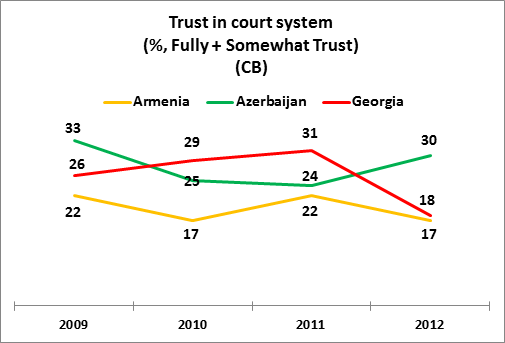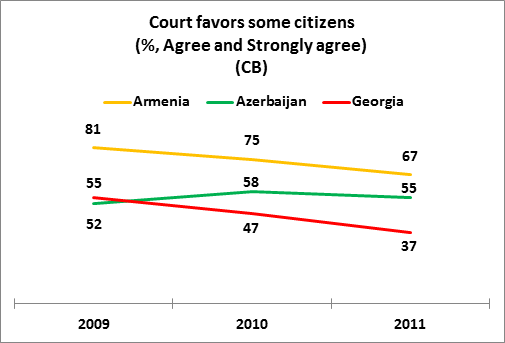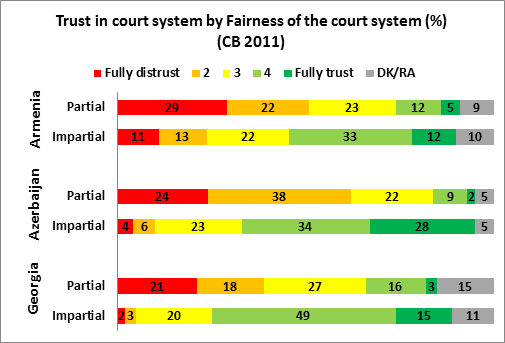Ann Bennett Lockwood, an American attorney, politician and author once said that, “If nations could only depend upon fair and impartial judgments in a world court of law, they would abandon the senseless, savage practice of war”. For many, the credibility of a government is judged by the fairness of itsjudicial system. For instance, Michel Rosenfeld (2001) argued that a fair justice system creates respect and faith in government by saying that, “If a citizen implicitly or explicitly endorses a law or legal regime, the latter can be considered subjectively fair.” Therefore, trust in judiciary system can be seen as a reflection of government performance, and is interpreted as one of the major conditions for a functioning democracy. Trust also signifies the perceived legitimacy of a particular institution. Data from the 2010 European Social Survey (ESS) shows that the perceived legitimacy of a country’s justice system may improve compliance with the rule of law more than the risk of punishment. Due process and equal protection before the law are stipulated in the Georgian (Article 14), Armenian (Article 14) and Azerbaijani (Article 25) constitutions. Yet, these populations tend to be skeptical about the practice and security of these constitutional rights. This blog discusses opinions and perceptions about the justice system in each of these countries.According to 2010 ESS data, Eastern and some Southern European countries tend to be less trusting of both police and court systems than Nordic countries, as well as less believing that these institutions are legitimate holders of judicial power. In the case of court systems, the South Caucasus populations are also skeptical. Each year the Caucasus Barometer (CB) asks respondents to assess their level of trust towards their court system. According to the 2010 CB, just under one third of Azerbaijanis (30%), and less than one fifth of Armenians (17%) and Georgians (18%) said they trusted their respective court system (the sum of “fully trust” and “somewhat trust”). In the latter two countries, the trust in the court system fell by 5% and 13%, respectively during the last 2 years (from 2011 to 2012). In contrast, Azerbaijanis have indicated slightly more confidence in their court system – trust increased from 24% in 2011 to 30% in 2012.
For a broader length of time, from 2009 to 2012, the level of trust in the court system has remained relatively similar in Azerbaijan (a change of 3%), and in Armenia (a change of 5%), while it has decreased by 8% in Georgia. In the 2011 CB, these populations were asked if “Bringing a case to the court will make the problem worse.” Comparing the results, 36% of Armenians, 36% of Azerbaijanis and 13% of Georgians agreed with this notion.
. From 2009 to 2011 the CB also asked to what extent people agreed or disagreed with one of the following statements–“The court system in their country favors some citizens” or “The court system in their country treats all citizens equally”. The results indicate that most frustration about the court system is felt in Armenia where two thirds (67%) of the population in 2011 thought that the court system was unjust and favored some citizens. However, this percentage has gradually decreased from 81% in 2009. A similar situation is observed in Georgia where from 2009 to 2011 these figures fell from 52% to 37%. In Azerbaijan the percentage change from 2009 to 2011 was low at 3%. Thus, the majority of adult citizens in Armenia and Azerbaijan believe that their court system treats favors some citizens over others. It is thus noticeable that the more the court system is perceived to favor some citizens is, the less there is trust in the court system.
From 2009 to 2011 the CB also asked to what extent people agreed or disagreed with one of the following statements–“The court system in their country favors some citizens” or “The court system in their country treats all citizens equally”. The results indicate that most frustration about the court system is felt in Armenia where two thirds (67%) of the population in 2011 thought that the court system was unjust and favored some citizens. However, this percentage has gradually decreased from 81% in 2009. A similar situation is observed in Georgia where from 2009 to 2011 these figures fell from 52% to 37%. In Azerbaijan the percentage change from 2009 to 2011 was low at 3%. Thus, the majority of adult citizens in Armenia and Azerbaijan believe that their court system treats favors some citizens over others. It is thus noticeable that the more the court system is perceived to favor some citizens is, the less there is trust in the court system.
 From 2009 to 2011 the CB also asked to what extent people agreed or disagreed with one of the following statements–“The court system in their country favors some citizens” or “The court system in their country treats all citizens equally”. The results indicate that most frustration about the court system is felt in Armenia where two thirds (67%) of the population in 2011 thought that the court system was unjust and favored some citizens. However, this percentage has gradually decreased from 81% in 2009. A similar situation is observed in Georgia where from 2009 to 2011 these figures fell from 52% to 37%. In Azerbaijan the percentage change from 2009 to 2011 was low at 3%. Thus, the majority of adult citizens in Armenia and Azerbaijan believe that their court system treats favors some citizens over others. It is thus noticeable that the more the court system is perceived to favor some citizens is, the less there is trust in the court system.
From 2009 to 2011 the CB also asked to what extent people agreed or disagreed with one of the following statements–“The court system in their country favors some citizens” or “The court system in their country treats all citizens equally”. The results indicate that most frustration about the court system is felt in Armenia where two thirds (67%) of the population in 2011 thought that the court system was unjust and favored some citizens. However, this percentage has gradually decreased from 81% in 2009. A similar situation is observed in Georgia where from 2009 to 2011 these figures fell from 52% to 37%. In Azerbaijan the percentage change from 2009 to 2011 was low at 3%. Thus, the majority of adult citizens in Armenia and Azerbaijan believe that their court system treats favors some citizens over others. It is thus noticeable that the more the court system is perceived to favor some citizens is, the less there is trust in the court system.
Despite the fact that the independence of courts is guaranteed by the constitutions and laws of Georgia, Armenia and Azerbaijan, many people in the South Caucasus still believe that the court system is unjust. A fair justice system can help to create an environment in which those subjected to a crime can seek justice, and those committing a crime can be held accountable under the law.
If you would like to explore more about trust in various institutions in the region, please visit https://caucasusbarometer.org/en/


